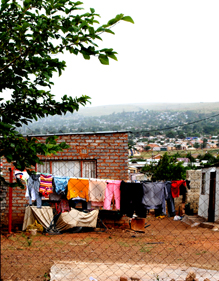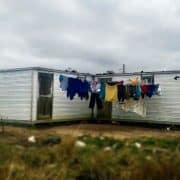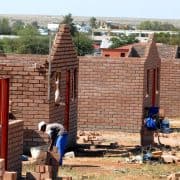|
Getting your Trinity Audio player ready...
|
 Poverty, it is said, is not a crime. Poor people do not ask to be in a position where they are at the mercy of others. Naomi Genu, from Kagiso in Mogale City, is just one of many who is paying a high price for being poor. In July this year, she will turn 40, and would have liked to be living in her own house by then.
Poverty, it is said, is not a crime. Poor people do not ask to be in a position where they are at the mercy of others. Naomi Genu, from Kagiso in Mogale City, is just one of many who is paying a high price for being poor. In July this year, she will turn 40, and would have liked to be living in her own house by then.
Instead, the closest she has got to living that dream is an empty promise from her local municipal housing office.
Six years after applying for an RDP housing subsidy in 2005, Genu received a call in March 2011 from an official in the Mogale City municipality asking her to report to the municipal office to sign for and collect the keys to her new house on a certain date.
Although the news was a surprise, her excitement was short-lived – hours later a second call came to postpone the appointment to another date, without any explanation. She has now been waiting for two years without any word from Mogale City regarding her house.
Soon after Genu applied for a house in a new residential development called Chief Mogale, she was told that she qualified for a subsidy, and was placed on a waiting list. The first correspondence from Mogale City was an sms instructing her to pay a R100 fee to install a water meter at her new house. Not long after paying this, she got the call about the symbolic signing for the keys.
And then silence.
“It did not make sense to me because people from my neighbourhood who also applied were being moved into the houses at Chief Mogale and I was asking myself when my turn would come,” Genu told Corruption Watch.
Rumours doing the rounds that the Chief Mogale houses were being sold to outsiders did not help.
“I found out about a community meeting where people from the housing [department] would come,” she recalled, adding that the opportunity to address the rumours gave her hope. At the meeting, which Genu alleged became tense soon after it started, then MEC of housing, Humphrey Mmemezi, told residents that his department had allocated some of the houses to former MK cadres and disabled people.
He also said that Genu and the rest of the beneficiaries who were still waiting would receive houses in another area later. MK is uMkhonto weSizwe, the armed wing of the ANC during the liberation struggle.
Read our quick guide with facts on low-cost government houses here.
Housing allocation policy
According to the Housing Database and Allocation Policy that was adopted by the provincial government in 2009, military veterans, including MK soldiers, the elderly and people with disabilities were placed in the “special needs” category and would be prioritised as beneficiaries for Gauteng’s housing programme. A set number of houses in the province would be made available to this group.
Tempers flared at the meeting when community members demanded answers from the authorities regarding why they had to relinquish their allocated houses and why they were told so late in the day of plans to prioritise the disabled and MK cadres, Genu recalled. The unoccupied houses, one of which she believes was hers, were now at the centre of what seemed like an allocation jumble that would draw attention to the policy implementation efforts of Mmemezi’s office.
Despite attempts by Corruption Watch to get the Gauteng department of local government and housing – which is now led by MEC Ntombi Mekgwe – to explain its position on the Chief Mogale matter, and whether there was an investigation into corruption claims by residents in the area, there had been no response at the time of publishing.
According to a report in the Sowetan newspaper in March 2012, 725 houses were built in the first phase of the Chief Mogale project; of these, 500 were occupied by beneficiaries from the surrounding areas. The rest, said the report, were believed to have been occupied by families who did not qualify.
On the other hand is another resident of Kagiso, David Mokone*, who admits he paid a bribe to an official who promised to help speed up his application. Mokone is married with two children and has lived in the township for over 10 years.
When he and his wife applied for a house in the 1990s, they did not anticipate such a long process. He was told he did not qualify because he was listed on the provincial house owners’ database as a homeowner. Mokone had previously applied for a home loan to buy a house, but was declined as he did not earn enough. However, his details were never removed from the database, a technicality that rendered him a home owner and disqualified him from a government subsidy.
Mokone claimed that out of desperation, he accepted an offer of help from the official, who told him she charged R800 of people who wanted to be put on the waiting lists. This was late in 2012, and when nothing had happened by January this year, Mokone reported the official to Corruption Watch. “I gave her R800, but I was not the only one,” said Mokone. “I know of many other people who know her in Kagiso who also gave her money.”
The official’s name is known to Corruption Watch.
“I’ve watched my children grow up in a room at the back of someone else’s house,” he says. “That is not what I want for my family.”
Mokone said he intended seeking legal advice. He was informed by Corruption Watch that it could not act on behalf of people who had already implicated themselves in criminal activity by paying a bribe.
List system abused
The beneficiary waiting list system is arguably the most intricate part of the government’s housing programme for the poor. Its susceptibility to corruption has marred efforts to deliver on the government’s promise in 1994 to house over 12-million South Africans. It is also hot topic of service delivery protests.
Residents of informal settlements often cite corruption on the part of public officials or contractors hired by the government, implying that they manipulate lists or accept bribes from people who are not on the lists but want to jump the queue.
According to Xolani Xundu, the spokesperson for the national Department of Human Settlements, allocating houses falls outside his department’s mandate, which largely involves the funding of the provincial housing projects and policy support.
A national list doesn’t exist, and provinces are left to manage their own databases. This, says Jack Bloom, the DA’s Gauteng spokesperson, is the root of the list problem. He argues that citizens need a practical, transparent approach to the way provinces manage their lists.
Depending on the housing model that is adopted by a province – in some the government is the sole authority for allocation, while others give that responsibility to private developers – potential beneficiaries are placed on the list by their municipalities. Where developers have allocation duties, they get the lists from the municipality. Once the lists are verified, their management is taken over by provincial housing departments where funding is arranged and land is identified for development.
It is clear, however, from the number of reports to Corruption Watch that this is not as straightforward in practice as in theory. In one case, an official in a municipal housing department in Gauteng is alleged to have intercepted the database to place an application for a relative who did not qualify for a house. An investigation of corruption is under way by the provincial department’s anti-corruption unit and the Office of the Public Protector.
A common concern of citizens and advocacy groups is that the non-transparent nature of the lists makes them susceptible to corruption. “We have asked for access to the lists on numerous occasions, but that has not happened,” Bloom told Corruption Watch. “There is just too much red tape from government.”
No accountability
According to a plan by the Human Settlements Department to improve the management of waiting lists, which was revealed to Parliament late in 2009, the accuracy of their information was one of the department’s challenges.
Reports linked to the allocation process make up 24% of all housing cases received by Corruption Watch. The same percentage of reports is of members of the public alleging houses are being sold by officials who then pocket the money.
In a recent presentation to parliament, Thuli Madonsela, the public protector, revealed that she had received almost 2 000 reports directly related to maladministration in the RDP housing sector. Her department travelled around the country in 2012 to consult with communities. Among the common complaints they heard were illegal occupation, the lengthy process of removing illegal occupants once they had been identified, and public officials either selling houses or allocating them to their friends or families.
Madonsela is investigating the sector and is expected to reveal findings sometime this year. But for Genu and others in her position, even if justice is served and those responsible are brought to book, the damage has been done.
* Name has been changed.







